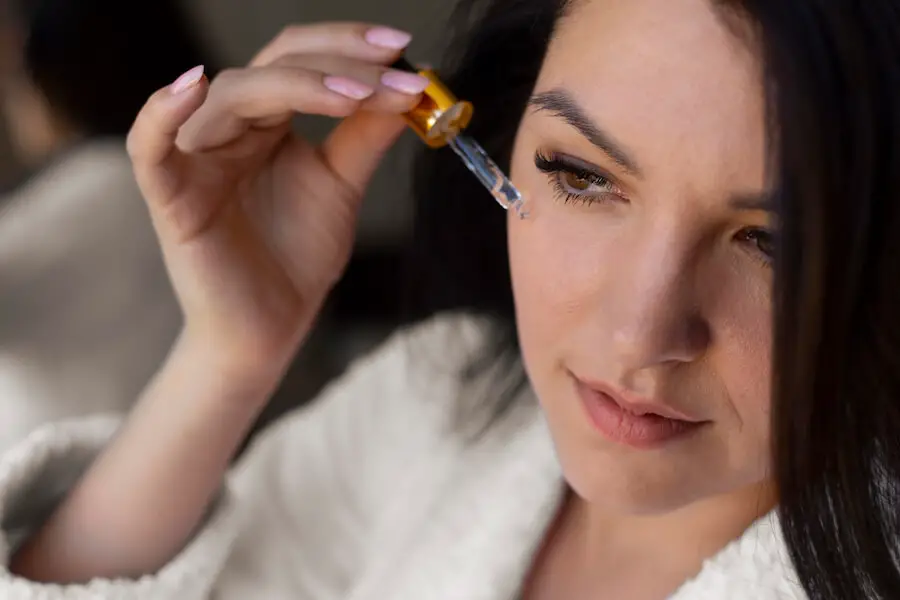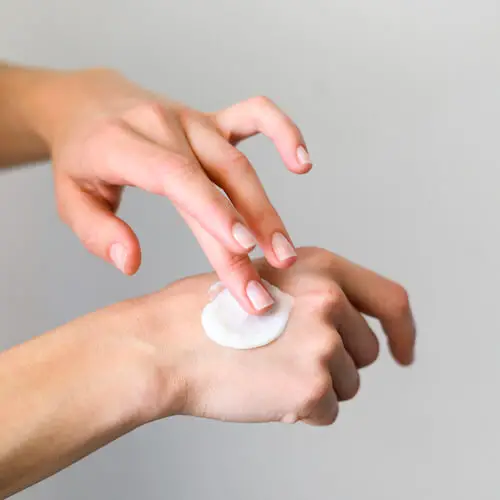When most people open their medicine cabinet. What do they see?
There, hidden at the back, behind your face wash and sunscreen. Maybe you’ll find that retinol night cream you religiously used the previous year. Or that peptide-enriched eye gel that never quite made your puffy eyes disappear.
A couple of years ago, I’d have found a similar stash. “There are so many products that promise to transform my skin,” I thought. “And yet I don’t want to keep buying them if they’re not really working.”
Whether middle-aged or in your early twenties, you’ve likely already built up a small collection of anti-aging lotions and creams – touted for all the amazing ways their “breakthrough” ingredients can make your skin look and feel younger.
But there’s one problem: the results are often less than spectacular. If you haven’t already heard, the so-called “retinol” is notoriously ineffective when used topically, and the same goes for many other ingredients in your night cream or eye serum.

Yet it always ends the same way. You try the product for a couple of weeks, only to shove it deep within your cosmetics drawer. Forgotten. Never to be seen again.
What Makes Topical Vitamin C Any Different?
Despite all of the anti-aging products and “miracle” ingredients on the market today, vitamin C has left a lasting impression on me.
Maybe it’s how silky soft topical vitamin C makes my skin feel. Or the way it lightened my imperfections after a couple of weeks of daily use. But since I first introduced a vitamin C serum to my skincare routine, my skin has never felt happier.
You’ve likely seen vitamin C featured prominently across the labels of concentrated serums, night creams, and moisturizers – even face masks and spot treatments. For good reason! There’s no doubt of its popularity in skincare. But what’s so special about topical vitamin C?
A lot, as it turns out! Let’s take a deeper look.
Vitamin C Works From the Inside Out
Unlike some anti-aging ingredients, vitamin C isn’t just an exfoliant. It doesn’t just work on the surface of your skin to smooth out wrinkles and plump up fine lines. Instead, it changes how your skin works from within.
And that’s what makes it so unique.
Vitamin C gets its anti-aging benefits from a number of actions deep inside the skin, where the real work happens.
It improves not only collagen production but also how well your body can produce it naturally. This helps minimize fine lines and wrinkles while smoothing out rough patches on your face that have been damaged by the elements.
Vitamin C is also known to help strengthen the skin’s barrier against harmful environmental stressors, which can lead to more balanced, radiant-looking skin.
What Makes Topical Vitamin C So Effective?
There’s one big reason why topical vitamin C works so well – it’s absorbed into your body far easier than you might think.
When it comes to topical vitamin C products, the most effective are those that contain L-ascorbic acid. The form of vitamin C is found in nature – which is perfectly suited for topical application on the skin.
So Is Topical Vitamin C Really Worth Adding an Extra Step to Your Skin Care Routine?
I think so.
I love the glow vitamin C gives to my skin, the refreshing tingling sensation, and how noticeably soft my skin feels after only two to three drops of the serum. But topical vitamin C does so much more than that.
Benefit #1: Topical Vitamin C Rejuvenates Aging Skin
A wrinkle here, some fine lines there. These are sure signs your skin is aging.
Luckily, your body is busy at work producing collagen, a protein that gives your skin some structural support. Collagen shapes up your skin, keeping it firm and supple so it continues to look its best.
But as time passes, your body stops producing as much collagen as it did when you were younger (source). The next thing you know, wrinkles start popping up in tandem. The result? Depressed, tired-looking skin.
Topical vitamin C actually helps your body rebuild lost collagen. In fact, it’s crucial for healthy collagen synthesis (source). By applying vitamin C directly to your face (in the form of a vitamin C serum), you’re giving your skin the extra support it needs to stay tight and beautiful longer.
“Vitamin C is critical for your body and plays an important role in maintaining healthy, resilient skin.” – doctoroz.com
Not only is topical vitamin C effective at protecting against wrinkle formation. Regular use has even been shown to reduce the appearance of wrinkles over time – both in-depth and number (source).
Benefit #2: Topical Vitamin C Helps Shield Skin from Sun Damage
Ever arrive back home, only to find acne that looks much worse than it did before you left?
A day out in the sun not only can darken breakouts. Over sun exposure can leave behind discolored red marks that take three to six months to completely disappear (source) – especially if you have sensitive skin prone to hyperpigmentation.
And who wants to walk around with a face full of polka dots? Not me.
If that wasn’t enough, sunlight can further accelerate the formation of those fine lines and wrinkles we talked about earlier (source) – even adding age spots to the mix.
While applying sunblock is crucial – and I mean crucial – to protect your skin from these types of problems, topical vitamin C can provide a little extra sun protection. The antioxidant properties of vitamin C can actually help prevent age spots and sun damage, gradually decreasing your number of sunburned cells (source).
“Virtually all plants and animals protect themselves from the sun using vitamins C and E.” – JAAD, Volume 48, Issue 6
Though there’s no doubt vitamin C is a powerful antioxidant, don’t expect it to replace sunscreen! Topical vitamin C works as an effective shield against sun damage – but only when used in conjunction with sunblock. In other words, vitamin C boosts the effectiveness of your SPF – not the other way around!
The takeaway? Vitamin C can’t solve all of your problems for you. Keep your skin protected; always apply sunscreen before leaving the house. And for an extra boost, go ahead and massage that vitamin C serum into your skin.
Make sure you apply your vitamin C serum before your sunscreen!
Benefit #3: Topical Vitamin C De-Stresses Stressed Out Skin
What do diet soda, cigarette smoke, and that deli sandwich have in common?
They all contain free radicals, unstable molecules (missing an electron) that steal electrons from stable molecules – turning them unstable.

Some pretty icky stuff.
And you can’t escape them. Free radicals are everywhere: in every meal, every glass of water, even the very air you breathe (source). As you can imagine, so much daily free radical exposure can really show on the skin-damaging your cells and accelerating the aging process in the skin.
The thing about our bodies is that they’re programmed to neutralize free radicals, but only up to a certain level. When we’ve maxed out the number of antioxidant molecules in the body, any new invaders slip by unopposed.
That’s where topical vitamin C comes in. Thanks to its antioxidant properties, vitamin C can capture free radicals, preventing them from wreaking havoc on the skin (source).
“Antioxidants are critical to your overall health and beauty. If you don’t have enough antioxidants in your body, many of the important systems that keep you healthy will begin to break down.
Antioxidants, like vitamin C, donate an electron to unstable molecules (free radicals), essentially restoring balance. Because vitamin C acts as – you guessed it! – an antioxidant, applying a vitamin C serum directly can help prevent further free radical damage for healthier, youthful-looking skin.
Benefit #4: Topical Vitamin C Lightens Imperfections
Acne, one of the most frustrating skin challenges I’ve had to face.
If you have acne-prone skin, you know the drill. Your pores clog, swell up with dead skin cells and bacteria, and enlarge – seemingly overnight! – forming an unsightly red bump that can take months to fully heal.
If you’ve ever had a giant red pimple that tried to sabotage a special outing or date, you know the aftermath can be rough. So, armed with your favorite cleanser, you combat the problem – even spot treat each blemish with some trusted benzoyl peroxide, salicylic acid, or tea tree oil.
But once those pores are clean and the swelling goes down, you’re often left with mortifying red marks or acne scars – glaring reminders of the blemishes you worked so hard to get rid of.
Enter vitamin C.
With regular use, topical vitamin C has been shown to heal discoloration caused by sun damage or inflammation. Basically, it helps to lighten imperfections like age spots and – yes – those post-breakout acne scars, for clearer, even-toned skin.
Benefit #5: Topical Vitamin C Is More Effective When Applied Directly
Did you know it’s even harder to maintain your stores of vitamin C over time (source)?
Since our bodies can’t make vitamin C for us, we have to get it from our diet. And you already know how important vitamin C is to aging skin.
Your skin will appreciate a topical boost of vitamin C – especially when you apply it where it counts to help prevent premature aging.
So, don’t forget to apply your vitamin C serum before moisturizer (and sunblock) every day!
It’s important to remember that antioxidants like topical vitamin C are extremely sensitive to light and heat. So store them in a cool place away from direct sunlight when you’re not using them.
“Applying vitamin C to the skin can be 20 times more effective than taking it orally.” – doctoroz.com
Sure, snacking on foods rich in vitamin C can do wonders for overall health. But it’s not the most effective way to boost your skin’s concentrations of vitamin C. In fact, not a whole lot of vitamin C actually reaches the skin when taken orally.
To deliver higher concentrations of vitamin C to the skin, it’s better just to apply a vitamin C serum directly to your face. And your options aren’t limited! There are plenty of vitamin C serums on the market, formulated to deliver concentrated amounts of this powerful vitamin where your skin needs it most.
Topical vitamin C serums are quickly absorbed deep into the skin (not just in the surface layers, like many lotions and moisturizers) – without an oily feel or thick consistency! So for great results, try a serum with concentrations of 20% vitamin C, applying it morning and night.
Benefit #6: Topical Vitamin C Promotes Skin Hydration
While vitamin C is a powerful antioxidant, it’s not really great at helping your skin get rid of dry patches or flaky dead layers. In fact, the harshness required to exfoliate dead skin cells doesn’t exactly jive with vitamin C ‘s gentle nature.
Still, topical vitamin C is great for your skin in other ways. Most notably, it’s one of the best ingredients to promote skin hydration – especially when combined with an oil-rich moisturizer.
Since it helps increase collagen production (which reduces fine lines and wrinkles), vitamin C is a smart addition to any anti-aging routine. And using it in combination with a nourishing, moisturizing cream will give your skin the softness and smoothness you’re looking for.
That’s not to say that vitamin C can’t be used alone as a hydrating treatment, too! Just mix together your favorite moisturizer or oil with an ample amount of topical vitamin C and apply it to your skin.
You’ll notice the difference right away – especially if you live in a high-altitude, smoggy city.
But Which Form of Vitamin C?
Now, the key benefits I’ve listed above are based on ascorbic acid – the purest (yet most unstable) form of vitamin C. But that doesn’t mean vitamin C derivatives like sodium ascorbyl phosphate won’t offer similar results.
In fact, while it’s touted as the most effective form of vitamin C, ascorbic acid can be very unstable and irritating to the skin – especially if your skin is naturally sensitive.

Many vitamin C derivatives are actually very gentle on the skin and much more stable – so you shouldn’t have to worry about topical vitamin C going bad before you’ve finished the bottle.
Studies actually show that sodium ascorbyl phosphate is very effective on acne-prone skin (source).
Just know that, depending on why you’re applying topical vitamin C, a vitamin C derivative can meet your needs without the irritation or instability of an ascorbic-acid-based vitamin C serum.
How Does Your Skin Feel About Vitamin C?
Topical vitamin C can help keep your skin looking and feeling great. But don’t expect results right away! Healthy, radiant skin takes time to nurture. And like all habits, caring for olive skin usually requires a consistent and patient approach.
Topical vitamin C works in your skin over time. It’s not immediate.
So don’t be discouraged if results are less immediate than you hoped for. I’ve seen great results within a few weeks of applying a vitamin C serum to my face morning and night, but everyone is different.
In some cases, it can take up to three months, sometimes six months, before you notice a marked improvement in the texture and tone of your complexion.
Stay committed, and you’ll notice a difference!
Is topical vitamin C worth adding the extra step to your everyday skincare routine? I think so.
But don’t just take my word for it – try it out and be your own judge! You can apply a vitamin C serum by itself or mix it with other antioxidants (like vitamin E and ferulic acid) for maximum benefit. Some serums actually already do this for you!
And don’t forget to use broad-spectrum sunscreen when you go outside! Vitamin C won’t do much for skin that’s regularly exposed to the sun and other environmental aggressors.

